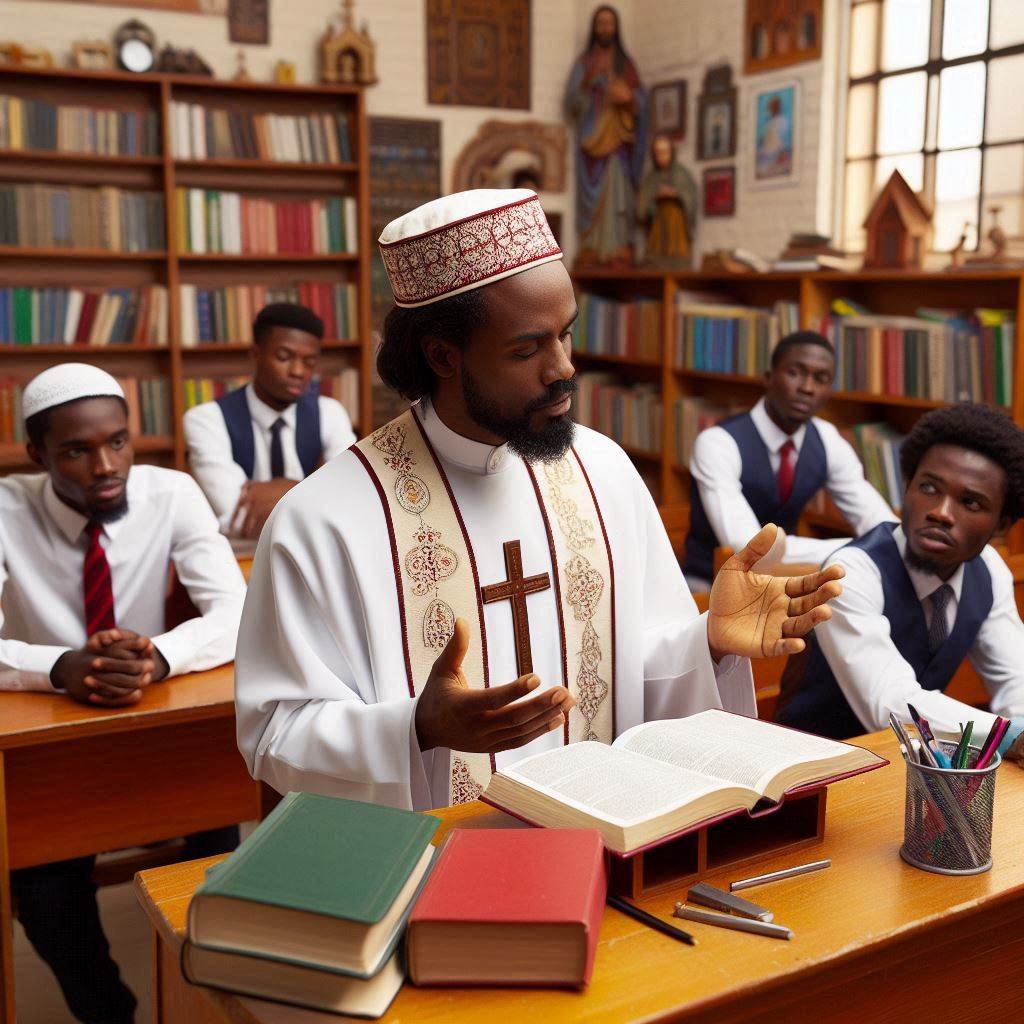Introduction
Christian Religious Studies in schools plays a crucial role in shaping students’ moral and spiritual development.
It helps students understand the principles and teachings of Christianity and foster a sense of community and empathy.
The curriculum is the foundation that guides students in exploring the core beliefs and values of the Christian faith.
It provides a structured framework that helps students deepen their understanding of Christian teachings and apply them to their daily lives.
By following a well-designed curriculum, students can gain a comprehensive understanding of the Bible, church history, and Christian ethics.
This allows them to develop critical thinking skills, empathy, and moral reasoning.
Moreover, the curriculum equips students with the knowledge and tools to engage in meaningful discussions about religious beliefs and practices.
It enables them to explore diverse perspectives and worldviews, fostering tolerance and respect for others.
Overall, the curriculum for Christian Religious Studies in schools is essential for nurturing students’ spiritual growth, moral development, and understanding of Christian values in today’s diverse and interconnected world.
Overview of Current Curriculum
An overview of the existing curriculum for Christian Religious Studies in Nigerian schools
The curriculum for Christian Religious Studies in Nigerian schools aims to educate students on the fundamental beliefs, practices, and teachings of Christianity.
It provides a framework for students to explore their faith, develop a deeper understanding of Christian principles, and apply them to their daily lives.
The key topics covered and the structure of the curriculum
- Introduction to Christianity: Students are introduced to the history and basic teachings of Christianity, including the life of Jesus Christ, the Bible, and the significance of key Christian festivals such as Christmas and Easter.
- Biblical Studies: Students study selected passages from the Bible to understand the major themes, characters, and events in both the Old and New Testaments.
- Christian Ethics: This topic focuses on moral and ethical principles derived from Christian teachings, emphasizing the importance of honesty, kindness, forgiveness, and compassion.
- Church History: Students explore the history of the Christian church, from its origins in the early church to its development and spread across different regions.
- Comparative Religions: In this topic, students compare and contrast Christianity with other world religions to gain a broader perspective on religious diversity and beliefs.
- Contemporary Issues: This section addresses current challenges and debates within the Christian community, such as gender equality, social justice, and environmental stewardship.
- Practical Applications: The curriculum also includes opportunities for students to apply Christian values and teachings to real-life situations, encouraging them to live out their faith in a meaningful way.
Read: Impact of Communication Arts on Nigerian Media
Challenges in the Current Curriculum
When it comes to the curriculum for Christian Religious Studies in schools, there are several challenges and limitations that need to be addressed.
These challenges not only impact the quality of education being provided but also hinder the overall effectiveness of the curriculum.
Lack of Diversity
One of the primary challenges in the current curriculum is the lack of diversity in the teachings and perspectives presented. This can lead to a narrow-minded approach and limit students’ understanding of different belief systems and worldviews.
Limited Critical Thinking
The current curriculum often fails to promote critical thinking skills among students.
Instead of encouraging them to question and analyze religious texts and teachings, it tends to focus on rote memorization and regurgitation of information.
This inhibits students’ ability to think for themselves and engage critically with the material being presented.
Lack of Inclusivity
Inclusivity is another area where the current curriculum falls short.
It may not adequately address the needs and perspectives of students from diverse backgrounds, including those with different religious beliefs or no religious affiliation at all.
This lack of inclusivity can make some students feel marginalized or excluded from the learning process.
Emphasis on Dogma
Some critics argue that the current curriculum places too much emphasis on religious dogma and doctrine, rather than fostering a deeper understanding of the underlying principles and values of Christianity.
This can lead to a superficial understanding of the faith and inhibit students’ ability to engage thoughtfully with complex theological concepts.
Insufficient Teacher Training
Another challenge in the current curriculum is the lack of sufficient training and support for teachers.
Educators may not receive adequate preparation to teach Christian Religious Studies effectively, leading to inconsistencies in instruction and limited engagement with students.
This can impact the overall quality of education being provided in the classroom.
Funding and Resources
Resource constraints can also pose a significant challenge to the effective implementation of the curriculum.
Schools may lack the necessary funding and resources to support a robust Christian Religious Studies program, including access to textbooks, materials, and professional development opportunities for teachers.
This can hinder the delivery of high-quality education to students.
Generally, it is evident that there are several challenges and limitations in the current curriculum for Christian Religious Studies in schools.
Addressing these issues is crucial to improving the quality of education being provided and ensuring that students receive a well-rounded and inclusive religious education.
Read: Language Arts Courses: What to Expect in Nigeria
Proposed Changes to the Curriculum
Suggesting Potential Changes or Additions to the Curriculum
Proposed changes to the Christian Religious Studies (CRS) curriculum aim to enhance students’ learning experiences.
One potential change is to incorporate more interactive and engaging activities into the curriculum.
This could include group discussions, role-playing exercises, and multimedia presentations to make learning more dynamic.
Additionally, introducing field trips to religious sites or inviting guest speakers from diverse religious backgrounds can provide students with firsthand experiences.
Moreover, integrating project-based learning activities where students can explore topics of interest and present their findings fosters creativity and critical thinking.
Another suggestion is to update the curriculum to include contemporary issues relevant to students’ lives.
This could involve discussions on topics such as social justice, environmental stewardship, and ethical dilemmas in the modern world.
By addressing current issues, students can see the relevance of CRS to their everyday lives.
Consider Incorporating More Interactive and Engaging Activities
Furthermore, incorporating more interactive and engaging activities into the curriculum can cater to diverse learning styles.
For example, incorporating technology-based activities such as online quizzes or interactive simulations can appeal to tech-savvy students.
Additionally, organizing debates or mock trials on ethical issues allows students to develop their argumentative and analytical skills.
Moreover, incorporating arts-based activities such as drama or music can provide alternative ways for students to express their understanding of religious concepts.
Overall, by implementing these proposed changes, the CRS curriculum can become more dynamic, relevant, and engaging for students.
Ultimately, proposing changes to the CRS curriculum to include more interactive activities and address contemporary issues can enhance students’ learning experiences and better prepare them for the complexities of the modern world.
Read: Exploring Semiotics in Communication Arts

See Related Content: Photography: Top Nigerian Photographers
See Related Content: Ethics in African and Asian Studies Research
Inclusion of Cultural and Historical Context
Importance of Cultural and Historical Context
Integrating cultural and historical context into the curriculum for Christian Religious Studies in schools is crucial for a comprehensive understanding of the faith.
Preservation of Heritage
By incorporating cultural and historical context, students can learn about the rich heritage of Christianity and appreciate its roots in different cultures and societies.
Understanding Diversity
Studying the cultural and historical aspects of Christianity can help students comprehend the diverse practices and beliefs within the religion across different regions and time periods.
Development of a Broader Understanding
By including cultural and historical context in the curriculum, students can develop a broader understanding of Christianity beyond just its theological aspects.
Contextualizing Religious Practices
Understanding the historical context of religious practices can provide students with insights into the significance and evolution of rituals and traditions within Christianity.
Exploring Different Perspectives
By learning about the cultural influences on Christianity, students can explore different perspectives and interpretations of religious teachings and beliefs.
Enhancing Critical Thinking Skills
Studying the cultural and historical context of Christianity encourages students to think critically and analyze how societal norms and values have shaped the religion over time.
Comparative Studies
Comparing the cultural practices of Christianity in different historical periods can help students develop analytical skills and appreciate the evolution of the faith.
Interdisciplinary Connections
Exploring the cultural and historical context of Christianity can also lead students to make connections with other disciplines such as history, anthropology, and sociology.
Therefore , including cultural and historical context in the curriculum for Christian Religious Studies in schools is essential for providing students with a well-rounded understanding of the faith and enhancing their critical thinking skills.
Read: Developing Critical Thinking in Language Arts
Gain More Insights: Language Proficiency for African and Asian Studies
Transform Your Career with Expert Guidance
Get personalized mentorship consulting that’s tailored to your unique path. Our expert advice is actionable and exclusive.
Get StartedIntegration of Ethics and Morality
The Integration of Ethical Teachings and Moral Principles into the Curriculum
The integration of ethical teachings and moral principles into the Christian Religious Studies (CRS) curriculum is essential.
By incorporating teachings on ethics and morality, students develop a strong foundation for ethical decision-making.
The curriculum can include discussions on ethical theories, such as utilitarianism, deontology, and virtue ethics.
Moreover, exploring biblical teachings on morality, such as the Ten Commandments and the Sermon on the Mount, provides practical guidance.
In addition, studying the lives of biblical figures who exemplified moral virtues, such as compassion and integrity, offers valuable role models.
Furthermore, examining contemporary ethical issues through a Christian lens helps students understand the relevance of moral principles today.
How This Can Help Students Apply Their Learning to Real-Life Situations
Integrating ethics and morality into the CRS curriculum helps students apply their learning to real-life situations.
By understanding ethical principles, students can navigate moral dilemmas with wisdom and integrity.
Moreover, applying moral teachings to their lives fosters character development and personal growth.
Furthermore, the integration of ethics and morality empowers students to become agents of positive change in their communities.
Overall, the integration of ethical teachings and moral principles into the CRS curriculum equips students with essential skills and values for life.
Lastly, integrating ethics and morality into the CRS curriculum is crucial for developing students’ ethical reasoning and moral discernment.
Conclusion
In summary, the curriculum for Christian Religious Studies in schools plays a crucial role in shaping the moral and spiritual development of students.
It provides a foundation for understanding Christian values and beliefs, and teaches students about the history and teachings of Christianity.
It is important to constantly revise and improve the curriculum to ensure that it remains relevant and engaging for students.
By incorporating current issues and relevant topics, students can better relate to the subject and apply its teachings to their daily lives.
Moreover, revising the curriculum helps to keep up with changing times and societal norms, ensuring that students receive a well-rounded education that prepares them for the challenges of the modern world.
It also helps to promote tolerance, understanding, and respect for different religious beliefs.
Therefore, it is essential for educators and policymakers to work together to review and enhance the curriculum for Christian Religious Studies in Nigerian schools.
By doing so, they can ensure that students receive a comprehensive and impactful education that helps them grow academically, morally, and spiritually.




